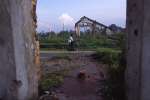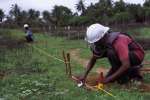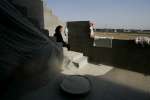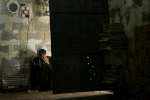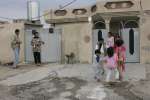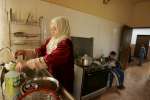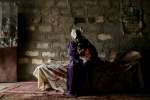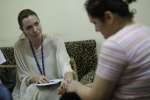- Text size
 |
|  |
|  |
| 
- Français
Iraq crisis aid operation pushes forward, many displaced need accommodation
Briefing Notes, 22 August 2014
This is a summary of what was said by UNHCR spokesperson Adrian Edwards – to whom quoted text may be attributed – at the press briefing, on 22 August 2014, at the Palais des Nations in Geneva.
UNHCR's operation to bring aid supplies into Iraq is in full swing following the first aid flight on Wednesday. The second Boeing 747 delivered more tents into Erbil last night (Thursday), around 19:00 local time, and flights continue today and tomorrow. Yesterday (Thursday) we loaded another 16 containers of aid (kitchen sets, blankets and jerry cans) from our warehouses in Dubai onto a ship due to sail to Bandar Abbas in Iran on Saturday. From there it will be loaded onto trucks for Erbil. This is part of our massive operation to ship in 2,410 tons of aid by air, land and sea over about 10 days for some 500,000 displaced people inside Iraq.
In north east Syria where thousands of mainly Yazidi refugees have fled since early August, the airlift of supplies from Damascus to Al Qamishly is going smoothly. The fourth out of six flights arrived yesterday with more tents, mattresses, wheel chairs, household items and rechargeable fans. The aid is being used to improve crowded conditions in the Newroz camp (where we now estimate about 6,000 people reside), and provide more privacy to the families. Movement in and out of the camp has stabilized in recent days. Another 3,000 Yazidis are staying in nearby towns and villages.
Meanwhile inside Iraq, shelter remains a top priority for displaced people – too many of whom are living in woeful conditions. The Kurdistan region of Iraq is now hosting close to 700,000 displaced Iraqis, most having arrived in early June. While accurate figures are not expected until early September when registration is complete, we estimate that hundreds of thousands are living in unfinished buildings, mosques, churches, parks and schools. Officials estimate half of the 5,746 schools in the Kurdistan Region are now sheltering displaced people or the military, raising concerns that they will not be able to open as scheduled for the new school year on 10 September.
While camps are often viewed as a last resort, displaced Iraqis are moving into them as quickly as tents can be pitched – such is the enormity of this crisis and the desperate need for shelter. Currently, there are two tented camps, Badjet Kandela in Duhok governorate and Baharka in Erbil which are open and housing more than 21,000 people. Twelve more camps will open soon including three in Sulaymaniya, six in Dohuk, and three in Erbil – after which there will be a total camp capacity of more than 85,000. There are also a handful of privately-run camps in Dohuk. Officials from the Kurdistan regional government are reviewing locations for more camps.
Many families missing key documents
Apart from the struggle to meet basic needs for food, water and shelter, a pressing issue for displaced people who fled their homes with next to nothing is a lack of civil documents – critical for being registered and getting cash assistance. Most displaced people have been unable to replace key civil documents without returning to their areas of origin – documents issued in Mosul for example cannot currently be replaced in Baghdad or Erbil. UNHCR is providing legal assistance to internally displaced people to help them replace key documents so they can register for aid and move freely.
There is also an urgent need to strengthen psychological services for displaced people, many of whom are deeply traumatized with the suddenness of their own flight, the death of loved ones, the separation of families, and horrific reports about the fate of others left behind, killed or captured. Our protection teams tells us of continuing reports of women, particularly from minority groups, abducted by armed groups (in Mosul and Sinjar) and held in various locations. Some have reportedly been forced to convert to Islam, and there are reports of others being trafficked by armed groups, inside and out of Iraq.
UNHCR appreciates the support of donors for its Iraq operation, particularly the Kingdom of Saudi Arabia which has provided $88.3 million to UNHCR as part of a $500 million donation to UN operations overall.
For more information on this topic, please contact:
- In Erbil, Ned Colt on mobile +964 780 917 4173
- In Erbil, Natalia Prokopchuk on mobile +964 780 921 7341
- In Geneva, Adrian Edwards on mobile +41 79 557 9120
- In Geneva, Ariane Rummery on mobile +41 79 200 7617
